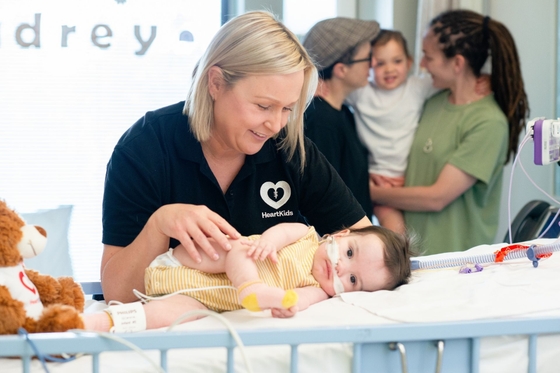
Better, faster medical intervention for people suffering heart attacks and angina
Media release: Wednesday 2 April 2025
Heart Foundation and Cardiac Society of Australia and New Zealand launch updated heart attack treatment advice
People suffering heart attacks and angina in Australia will now be diagnosed and treated faster and more effectively thanks to a new clinical guideline for Acute Coronary Syndromes (ACS) released today.
The launch of the new Guideline comes as the Heart Foundation reminds people not to delay calling Triple Zero if they experience symptoms.
The updated acute coronary syndromes (ACS) Guideline provides doctors and emergency department healthcare workers with the most up to date tools and recommendations to diagnose potential heart attacks and angina.
One of the key updates is the inclusion of a new treatment pathway which involves using a more sensitive blood test to help doctors in emergency departments more rapidly determine if chest pain is a heart attack or not.
Rapid, accurate identification of heart attack
Troponin is a protein that is released into the blood when heart cells are damaged.
Heart Foundation Chief Medical Adviser, Professor Garry Jennings said the new treatment pathway more strongly recommends a high-sensitivity cardiac troponin blood test which would allow healthcare professionals to more quickly and accurately detect heart attacks when people presented for care.
People encouraged to act quickly on heart attack symptoms
The Heart Foundation is leveraging the launch of the new Guideline to remind people to be aware of heart attack symptoms and call Triple Zero (000) immediately – even if unsure.

Every minute matters with a heart attack,” Professor Jennings said. “We still have delays in people presenting for evaluation of heart attack in Australia and that’s something not for the clinicians, but for patients to consider the warning signs and act on them without delay.”
Professor Garry Jennings
Chief Medical Advisor
Melissa’s story
New South Wales resident Melissa Gardiner was 52 years old in October 2021 when she was shocked to learn she had experienced a heart attack. With shortness of breath and arm pain as her only identifiable symptoms, Melissa is now aware of the range of heart attack symptoms, such as fatigue, nausea, vomiting and dizziness.
"When I had my heart attack, I didn’t know it was a heart attack. I think when people think of a heart attack, they think of a person clutching their chest and dropping to the ground, but not everyone experiences one like that,” she said.
If the guideline is going to help people get recognised for a heart attack quicker, it is going to save lives. I’m sure plenty of people have symptoms of a heart attack, but they aren’t picked up straight away.”
Melissa Gardiner
Experienced heart attack at 52
These recommendations underpin the Heart Foundation’s MyHeart MyLife patient support program, designed to help people who have had a heart attack or been diagnosed with coronary heart disease to reduce the risk of another event and improve their quality of life.
Key updates in the new guideline
- New treatment pathway using high-sensitivity cardiac troponin blood tests for faster and more accurate diagnosis of heart attacks
- Stronger recommendations on the timing of heart attack treatment to improve a person’s chance of survival and quality of life
- New advice on blood thinning medicines used to prevent repeat heart attacks in the long term
- New treatment target for cholesterol
- How to manage specific types of heart attack and serious complications, including new advice on the management of SCAD, a condition more commonly experienced by women
- Practice points which address the unique needs of priority populations with suspected or confirmed ACS including women, older adults, First Nation peoples and people living in regional and remote areas
- Best practice care after discharge from hospital, including mental health support for better health and quality of life after a heart attack.
Detecting under-recognised heart attacks
Professor Jennings highlighted the recognition of heart attack variations as a key inclusion in the new guideline.
“In the past, heart attacks were largely understood as resulting from a narrowed and blocked artery, but we now know there are variations to this and the need for different treatments,” Prof Jennings said.
“One example would be spontaneous coronary artery dissection (SCAD), a condition that primarily affects women and requires a different approach to management. As our understanding of SCAD and its underlying cause has improved, treatment has become more tailored, and this is recognised in the new guideline which now encourages healthcare professionals to consider SCAD as a potential cause of ACS.”
Tailored practice advice for underserved populations
The guideline includes practice points which address the unique needs of priority populations with suspected or confirmed ACS.
“We know that disparities still exist in the diagnosis and treatment of heart attack in some groups of people,” explained Prof Jennings.
“These groups include women, older adults, First Nations peoples and people living in regional and remote areas. Including practice advice tailored to these groups in the guideline is a critical step to reducing inequities in the care of people with ACS.”
How the Guideline was developed
The guideline has been developed by the National Heart Foundation of Australia (Heart Foundation) in collaboration with the Cardiac Society of Australia and New Zealand. The Heart Foundation acknowledges partial funding from the Cardiac Society of Australia and New Zealand and Perpetual towards the development of the guideline.
The new guideline replaces the National Heart Foundation of Australia & Cardiac Society of Australia and New Zealand: Australian Clinical Guidelines for the Management of Acute Coronary Syndromes 2016.
It has been endorsed by 15 peak body organisations to date including:
- Advanced Pharmacy Australia (AdPha)
- Australasian Cardiovascular Nursing College (ACNC)
- Australasian College for Emergency Medicine (ACEM)
- Australian and New Zealand Society of Cardiac and Thoracic Surgeons (ANZSCTS)
- Australian Cardiovascular Health and Rehabilitation Association (ACRA)
- Australian Physiotherapy Association (APA)
- Central Australian Rural Practitioners Association (CARPA)
- Council of Remote Area Nurses of Australia (CRANA)
- Exercise & Sports Science Australia (ESSA)
- Internal Medicine Society of Australia and New Zealand (IMSANZ)
- National Association of Aboriginal and Torres Strait Islander Health Workers and Practitioners (NAATSIHWP)
- The Australasian College of Paramedicine (ACP)
- The Australian Resuscitation Council (ARC)
- The National Rural Health Alliance (NRHA)
- The Royal College of Pathologists of Australasia (RCPA).
You might also be interested in...
.png?width=550&height=auto&format=pjpg&auto=webp)
New ACS guideline
New Australian clinical guideline for diagnosing and managing acute coronary syndromes (ACS) 2025

Catalyst Partnership Grants Showcase event
The Catalyst Partnership Grants Showcase event will unite more than 300 attendees for the first event of its kind in Australia: the hunt to find and fund game-changing innovations for heart health.

Heart Foundation and HeartKids unite to help children impacted by heart disease
The Heart Foundation and HeartKids can today announce they are joining forces in a partnership which will accelerate their work towards their vision for all Australians impacted by childhood-onset heart disease.
Last updated03 April 2025